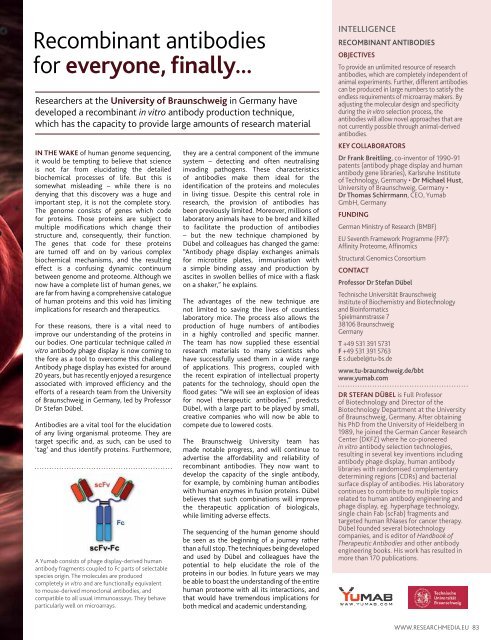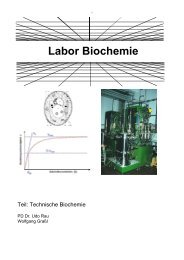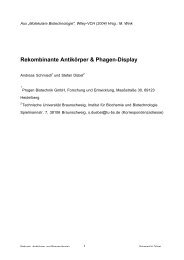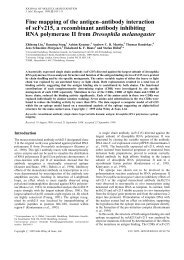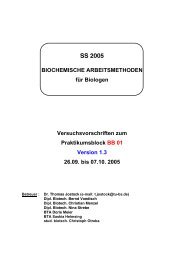Antibody Factory - Technische Universität Braunschweig
Antibody Factory - Technische Universität Braunschweig
Antibody Factory - Technische Universität Braunschweig
- No tags were found...
Create successful ePaper yourself
Turn your PDF publications into a flip-book with our unique Google optimized e-Paper software.
Recombinant antibodiesfor everyone, finally...Researchers at the University of <strong>Braunschweig</strong> in Germany havedeveloped a recombinant in vitro antibody production technique,which has the capacity to provide large amounts of research materialIn the wake of human genome sequencing,it would be tempting to believe that scienceis not far from elucidating the detailedbiochemical processes of life. But this issomewhat misleading – while there is nodenying that this discovery was a huge andimportant step, it is not the complete story.The genome consists of genes which codefor proteins. Those proteins are subject tomultiple modifications which change theirstructure and, consequently, their function.The genes that code for these proteinsare turned off and on by various complexbiochemical mechanisms, and the resultingeffect is a confusing dynamic continuumbetween genome and proteome. Although wenow have a complete list of human genes, weare far from having a comprehensive catalogueof human proteins and this void has limitingimplications for research and therapeutics.For these reasons, there is a vital need toimprove our understanding of the proteins inour bodies. One particular technique called invitro antibody phage display is now coming tothe fore as a tool to overcome this challenge.<strong>Antibody</strong> phage display has existed for around20 years, but has recently enjoyed a resurgenceassociated with improved efficiency and theefforts of a research team from the Universityof <strong>Braunschweig</strong> in Germany, led by ProfessorDr Stefan Dübel.Antibodies are a vital tool for the elucidationof any living organismal proteome. They aretarget specific and, as such, can be used to‘tag’ and thus identify proteins. Furthermore,A Yumab consists of phage display-derived humanantibody fragments coupled to Fc parts of selectablespecies origin. The molecules are producedcompletely in vitro and are functionally equivalentto mouse-derived monoclonal antibodies, andcompatible to all usual immunoassays. They behaveparticularly well on microarrays.they are a central component of the immunesystem – detecting and often neutralisinginvading pathogens. These characteristicsof antibodies make them ideal for theidentification of the proteins and moleculesin living tissue. Despite this central role inresearch, the provision of antibodies hasbeen previously limited. Moreover, millions oflaboratory animals have to be bred and killedto facilitate the production of antibodies– but the new technique championed byDübel and colleagues has changed the game:“<strong>Antibody</strong> phage display exchanges animalsfor microtitre plates, immunisation witha simple binding assay and production byascites in swollen bellies of mice with a flaskon a shaker,” he explains.The advantages of the new technique arenot limited to saving the lives of countlesslaboratory mice. The process also allows theproduction of huge numbers of antibodiesin a highly controlled and specific manner.The team has now supplied these essentialresearch materials to many scientists whohave successfully used them in a wide rangeof applications. This progress, coupled withthe recent expiration of intellectual propertypatents for the technology, should open theflood gates: “We will see an explosion of ideasfor novel therapeutic antibodies,” predictsDübel, with a large part to be played by small,creative companies who will now be able tocompete due to lowered costs.The <strong>Braunschweig</strong> University team hasmade notable progress, and will continue toadvertise the affordability and reliability ofrecombinant antibodies. They now want todevelop the capacity of the single antibody,for example, by combining human antibodieswith human enzymes in fusion proteins. Dübelbelieves that such combinations will improvethe therapeutic application of biologicals,while limiting adverse effects.The sequencing of the human genome shouldbe seen as the beginning of a journey ratherthan a full stop. The techniques being developedand used by Dübel and colleagues have thepotential to help elucidate the role of theproteins in our bodies. In future years we maybe able to boast the understanding of the entirehuman proteome with all its interactions, andthat would have tremendous implications forboth medical and academic understanding.IntelligenceRecombinant antibodiesOBJECTIVESTo provide an unlimited resource of researchantibodies, which are completely independent ofanimal experiments. Further, different antibodiescan be produced in large numbers to satisfy theendless requirements of microarray makers. Byadjusting the molecular design and specificityduring the in vitro selection process, theantibodies will allow novel approaches that arenot currently possible through animal-derivedantibodies.KEY COLLABORATORSDr Frank Breitling, co-inventor of 1990-91patents (antibody phage display and humanantibody gene libraries), Karlsruhe Instituteof Technology, Germany • Dr Michael Hust,University of <strong>Braunschweig</strong>, Germany •Dr Thomas Schirrmann, CEO, YumabGmbH, GermanyFUNDINGGerman Ministry of Research (BMBF)EU Seventh Framework Programme (FP7):Affinity Proteome, AffinomicsStructural Genomics ConsortiumCONTACTProfessor Dr Stefan Dübel<strong>Technische</strong> Universität <strong>Braunschweig</strong>Institute of Biochemistry and Biotechnologyand BioinformaticsSpielmannstrasse 738106 <strong>Braunschweig</strong>GermanyT +49 531 391 5731F +49 531 391 5763E s.duebel@tu-bs.dewww.tu-braunschweig.de/bbtwww.yumab.comDr Stefan Dübel is Full Professorof Biotechnology and Director of theBiotechnology Department at the Universityof <strong>Braunschweig</strong>, Germany. After obtaininghis PhD from the University of Heidelberg in1989, he joined the German Cancer ResearchCenter (DKFZ) where he co-pioneeredin vitro antibody selection technologies,resulting in several key inventions includingantibody phage display, human antibodylibraries with randomised complementarydetermining regions (CDRs) and bacterialsurface display of antibodies. His laboratorycontinues to contribute to multiple topicsrelated to human antibody engineering andphage display, eg. hyperphage technology,single chain Fab (scFab) fragments andtargeted human RNases for cancer therapy.Dübel founded several biotechnologycompanies, and is editor of Handbook ofTherapeutic Antibodies and other antibodyengineering books. His work has resulted inmore than 170 publications.www.researchmedia.eu 83


